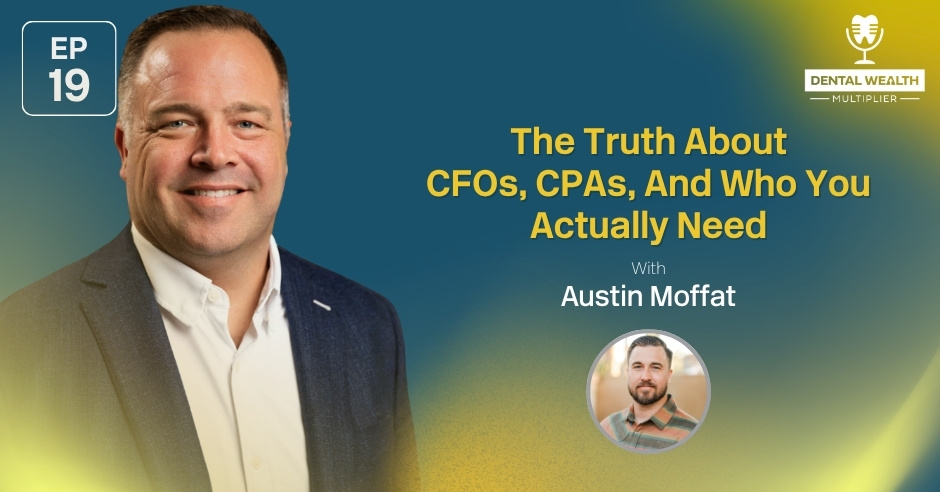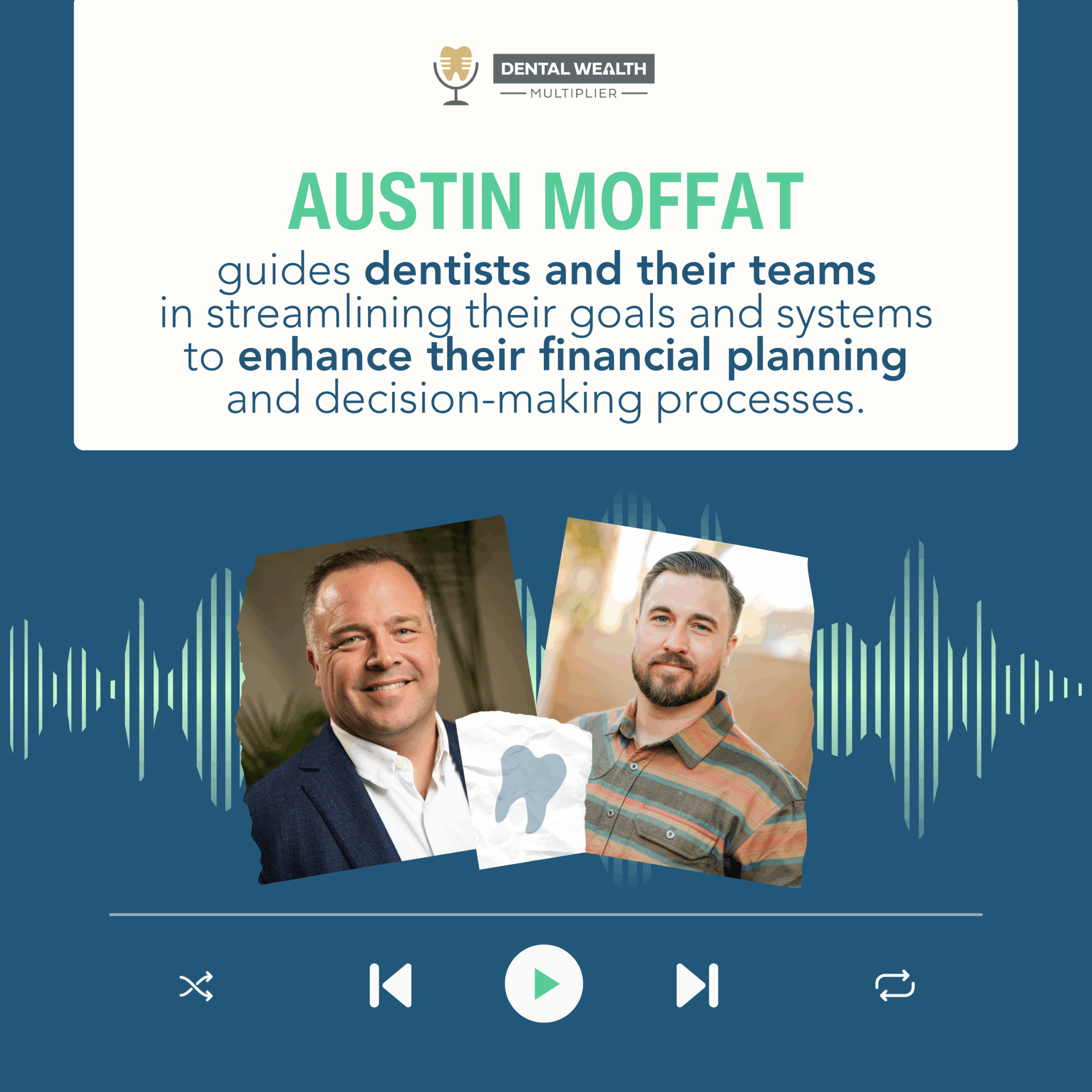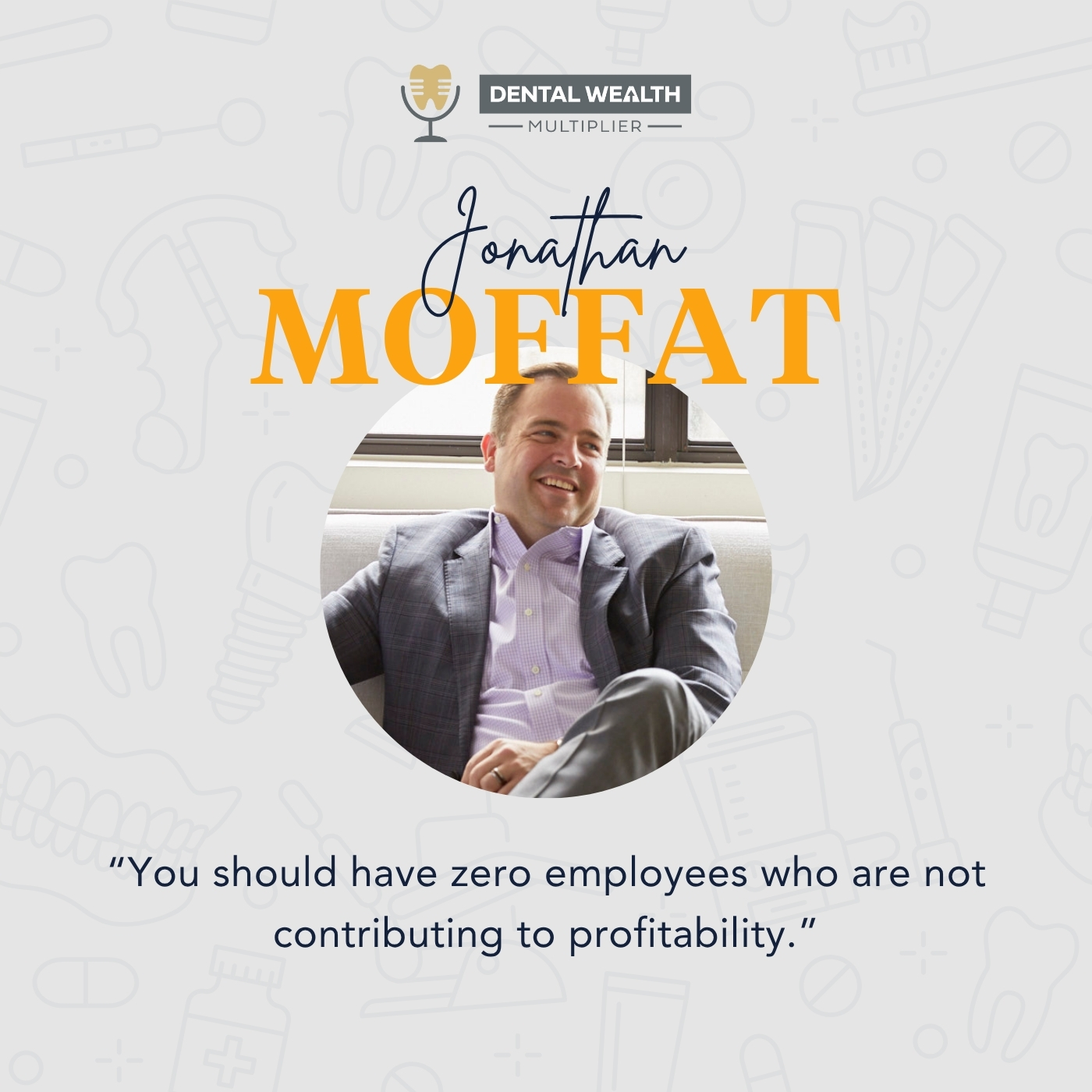
Financial planning and decisions are vital aspects of any dental practice. When in need of professional help, which one do you need to get: CFOs, CPAs, or bookkeepers? Jonathan Moffat and Austin Moffat break down the confusion of these seemingly similar yet extremely different financial roles and what growing dental practices actually need to make informed financial decisions. From cash flow clarity to strategy-level support, they share when a fractional CFO makes sense and when better organization is all it takes.
Find Jonathan at jonathanmoffat.com
Learn more about Aligned Advisors at alignedadvisors.com
Connect with Austin and the team at dsocfo.com
Find Jonathan on LinkedIn: linkedin.com/in/jonathanmoffat1
Find Austin on LinkedIn: linkedin.com/in/austin-moffat-88715a59
New episodes every week to help you take control of your business and your financial future. Visit dentalwealthmultiplier.com for more!
—
Watch the episode here
Listen to the podcast here
The Truth About CFOs, CPAs, And Who You Actually Need With Austin Moffat
I have with me again Austin Moffat, who is the President and one of the Founders of DSO CFO. Austin has been with us before. Welcome back. I’m making this all official. If you can’t tell by our last name, we’re brothers. He’d probably be less official as my guest.
I am so stoked to be back on. I’m excited, and we’ve got a good topic.
Why And When Do You Need A CFO
This is something that we hear. I know you probably hear it all the time. too. I was on the phone with a client in a couple locations and they’re like, “I need a full-time controller.” I was like, “Let’s have that conversation. Do you need it?” What’s interesting is, I had a conversation. We’re on a show a couple weeks ago. It’s about running efficient operations, the efficient practices, efficient group practices in businesses or whatever.
One of the biggest things is when you have non-revenue generating employees, highly compensated employees. It can be one of the biggest drags on the business. You have an employee, highly paid and not contributing any revenue. I’m sure a CFO or controller would argue, “My six-figure salary is worth it because I’m going to save you money.” It’s not generating money. Anyways, it’s still contributing to the bottom line but what’s the reality? I was talking to this client and I was like, “Let’s have that conversation.” What all he wanted to know is that someone was overseeing and the bills were getting paid on time and they were collecting their money. That’s ultimately what it came down to.
It’s tough. I will say, every now and again, it’s probably a couple times a quarter. We’ll get people not compliance, though. They’ll come to us and say, “We need a CFO.” Sometimes, they’re correct and other times they’re not. I would say probably months ago, I had a pretty large group out of the Midwest. They reached out to me and said they wanted a freshman CFO and I said, “Give me the rub. What’s going on?” They were big. A double digit and a multiplication group. I said, “You probably need a full-time CFO.”

Let’s say the more common thing is that we’ll get groups that are in the single digits of practices and they’ll say, “We need a CFO.” That’s not necessarily true. In fact, I would say you’re probably not ready for that. What that needs is you to understand your financials and cashflow. You want to be told, are you good or are you not good, and when you’re not good looking, what can you do to improve so that you can be better?
I would say that’s the biggest thing. We talk people through that a little bit and what ends up happening is we’ll end up saving them a several thousand dollars a year. You just need someone strong to understand the financials, understand dental and the finances. You’re walking through the financials on a regular basis and you’re understanding what is going on in your practices. That’s probably what’s needed. CFO is a big title. It’s a chief executive. These people are experiencing it, they know what’s going on. They have a lot of opinions. They’ve been there and done that. There’s a lot of value in CFOs, but there is a time when you go that route.
Generally speaking, what is that time?
A lot of it is based on the business. You could go on revenue. I would say probably start looking in that route between $15 million to $20 million in annual revenue above the rate that you need to bring that in. Before you do that, do you have a strong foundation, meaning do you have a strong accounting team or bookkeeper or in-house accountant or staff accountants or senior accountant or controller? Is that strong? I’ll tell you what a CFO won’t do. A CFO will not do the bookkeeping. They will not be paying the bills. They will not be putting their reports together.
They might put some reports together, but they stay at a high level. All that stuff is rolled up to them. They do the analysis, the forecasting, the budget creations and the cashflow analysis. The strategy is what they’re good at. Again, if they’re familiar in the dental industry, then they’re going to know a couple of vendors that they’ve worked with in the past that can help and attack some of the areas, some of the pain points of the practices.
You need to have a solid and strong accounting foundation before you get to finance. I usually say, you need clean and solid financials before you can have some fun. The fun is always in the analysis. It’s always the analysis, the forecasting and the budgets. It’s all the what-if scenarios. That’s a lot of fun, but it’s pointless if the data isn’t accurate or clean.
You need to have a solid and strong accounting foundation before you get to finance. Share on XIt’s funny you’re saying that. I was thinking of a mutual client that we have and he wanted to hire a CFO or controller. He found this guy and he was all hyped on him. The guy wanted a six-figure salary and then the clients were like, “Alright. Cool.” When the guy was coming in, we were telling the client too and we even offered to interview him. Maybe we did interview him. I can’t remember. It’s been several years ago, but basically the guy was like, “I’m not doing the books. I’m not doing the AP. I’m not going to run payroll.” The client was like, “I’m paying you six-figures. What are you doing?” He’s like, “I’ll help you make a high level financial decision.”
At the end of the day this is a mistake I’ve made myself and learned. What had happened, a guy wanted some crazy number like well into the six figures. Our client was like, “How about I pay you like $90,000 or $95,000?” I can’t remember exactly but the guy took the job but what it was, he was just taking a job while he found another job like a job, he wanted that was going to pay him. I made that same mistake hiring myself.
The point is, even that client which there’s six or seven practices. The revenue has to be there. As you said, a strong foundation of an accounting program, whether that’s internal or external. You have a big enough need because the reality is even a good solid accountant. I don’t necessarily want to call a bookkeeper because they’re more than one bookkeeper. It’s like accounting, which isn’t a CPA. It’s a middle ground that you guys do a good job of filling.
What I think a lot of doctors and a lot of business owners are saying when they want to hire a CFO is like, “If I want to go buy this practice and make X investment, I want to know how that’s going to impact my business. I want to sit down with someone and have them model that out.” Which most bookkeepers aren’t going to do and most CPAs aren’t going to do, but that’s that niche that you guys fit, which is, you probably don’t need a CFO or a controller but we’re going to fulfill that role that in between and make sure you get the reports, the information and the expertise that you need at the level you’re at.
To your point, we slide. Our team has bookkeepers. They do pretty much almost all the heavy lifting but then to your point, it’s like, “When do I have enough cashflow to go after location number four?” That’s going to be more. It’s going to be more skill set than a bookkeeper because bookkeeping, you’re looking back then there’s like a transition. Maybe call it a career if you will or maturity move. When you go from bookkeepers, senior accountant, controller, VP of finance, or CFO. All the finest positions, but you transition from accounting to finance.
Believe it or not, those are two separate things. The accounting, you’re looking back at the historical. The finance, you’re looking at the current and the forward thinking. That forward thinking is where you have to make sure that the data is correct but you have to know exactly what you’re doing and what assumptions that you have. Again, that comes back to you, what if I want to step back from the chair? What does that look like? I want to keep my $250,000 salary but also, I need to bring in another associate to fill in for the production that I was doing. Plus, I need to pay them another 30% to 32% of what it is that they’re doing.

That’s going to add an additional salary of between $15,000 and $20,000 a month to an associate doctor. Now, I’m taking on this. What does that look like if I were to step away? Maybe we build another opportunity and there’s some cap. Those are massive assumptions. You need to have a little bit of professional maturity in the finance world. Again, using that historical data as your standing point to make assumptions. Anyway, back to your initial comment. We slide on the needs of our clients and most of it is bookkeeping.
We know that when you’re looking at the financials, naturally these discussions are like, “What if we were at goal? What if we hit our revenue and expense goals? What is the potential of this practice?” “Let us show you.” Now, we slid from bookkeeper to now a controller. “Here you go.” What if we were to go and get another location?” Now you’re sliding into CFO. Again, take these needs. Not to not to over-complicate it, but all these questions are great questions. They’re natural and organic questions. Questions that you should be asking if you want to scale and if you want to grow.
It’s not a one size fits all. It’s like what needs do you have at the moment. If it’s constantly growing then maybe you do. At a certain point if you’re going from 8 locations to 20 in like 18 months or 12 months or whatever then maybe you do need somebody in there. You need someone to make sure that the cash is there. You need someone to make sure that the business decisions and the acquisitions that you’re considering are good deals. That they’re going to cashflow. You’re not acquiring massive debt upon debt.
Differences Between Bookkeepers And CFOs
No, that’s good. I’m looking at most practices and most people reading this, have a bookkeeper. They have someone who’s giving their financials every month. What’s that like? If you’re not feeling like that’s giving you the answers you want or not feeling like that’s giving you the insights that you want. Again, a lot of people just think, “I have my bookkeeper. My CPA just helps me with my taxes.” The next step is to go hire a CFO or controller. It’s a thought process for a lot of people. What does that ideal scenario look like for most practices where you’re like, “If you’re basically under $10 million in revenue, then what you need is this?”
It’s so much by scenario. I’ll just say that more mature finance professionals are not cheap. A full-time salary is going to be easily between $70,000 and $100,000. I would say $120,000. It’s probably for the higher level. That’s becoming more common. That being said, an ideal situation is like this. You need your CPA because you need to file taxes legally. Plus, make sure that you’re staying compliant. You have to have it, but a lot of CPAs don’t do books.
A CPA will help you file taxes legally and stay compliant. However, they will not do books. Share on XAlso, I would argue that a lot of CPAs don’t understand dental. They just happen to serve some dentists, for example. There is a value in having like niched individuals coming in and helping you but you need your CPA, period. From day one, you have to have one. If you’re not getting or feeling like you’re understanding your financials, your financial situation, cashflow, or whatever. You don’t know if you’re in a good spot, then have that discussion with your bookkeeper. If you’re still not having that, you need to go and find someone that has maybe a little bit more senior experience or senior accountant. I’ll say sure a controller is fine but the product controller might be a little bit too heavy for that. I would say you need to get a senior level individual.
Now that’s something that we do. We provide that, but you don’t need to use just us. There are other good people out there that you can use that can help provide a ton of value. I would have your CPA or senior accountants or whatever you want to but again, what are they handling? Are they handling all the payroll, bookkeeping, accounts payable and all that stuff because my guess, that’s a lot for just one person to handle like an $8 million revenue location, for example. You might need to have someone a little bit below. It could be part-time or full-time. Whatever.
That threshold when you feel like you’re getting closer to $15 million to $20 million, then you need to reassess. I’ll tell you this. It’s been interesting over the years of working with several DSOs, banks and funding partners and such. There’s been a time where the banks who are involved in some practices or some groups rather, they’ve required, “At this point in revenue.” You’re like, “We strongly suggest or advise that you bring in a full-time CFO.”
We’ve had a client and it’s one of my very first clients that I worked with the years ago. The banks said, “You’ve hit the threshold. It’s time to hire full-time CFO.” I don’t think they were wrong. I thought it was a little premature but I don’t think they were entirely wrong either. That’s a big pill to swallow That’s going to be minimum, about $20,000 or $50,000 a year in salary at minimum. Is that something that you can justify or something you can handle?
Again, those are decisions that you need to make as the business owner in that situation. The foundation must be CFO, strong accountants and those who have to be your one, two punch. If you’re not getting it then, there are senior level accounts out there that can get you through those weeds no problem. We do it. We work with massive groups, so it can be done.
Most Important Numbers To Pay Attention To
As you look through financials and meet with your clients every week, what’s something that you would advise everyone? You’re like, “If you only pay attention to this one or these two numbers, this is what I would be paying attention to.”
I’ll leave it to this. This is so fun. I love being in the position that we’re in because a lot of our clients are like-minded in the sense of like they’re all fairly entrepreneurial minded, which is so fun. I would say we are as well, which is such a good, such a good relationship there. As a result, we have clients that will often send us practices that they want to acquire, whether they get them from a broker or a friend or whatever. They’re looking at deals. I have a massive testament from me over here that I will immediately look at the revenue first then I’ll look at the clinical expenses like dental supplies and labs. Usually, the one, two punch.
We know that it should not be over 6% of your revenue in dental supplies. You should not be over 5% in labs. If you’re over in those then let’s go get payroll. The biggest expense in any practice. You should not be over 50%. Without even looking at the bottom line, those are the three or four things that I’ll look at, revenue, dental supplies, lab fees, and payroll all-in as a percent of revenue. If they’re over those 11% in clinical expenses at 50% on payroll. I’ll go to Vegas now and I’ll bet these guys are having a hard time breaking even, period.
For me, those are the three things, revenue, what’s that looking like, clinical, expenses and payroll. If they’re over, they’re having a hard time now. There’s opportunities because you have groups that feel like they have their recipe down, meaning that every location, they are nailing 6% of revenue or 5% revenue in supplies, 3% or 4% in labs. Their payrolls at 47% to 48% in all the locations. They’ve got their ingredients. They’ve got their recipe. They’re pretty comfortable once they get in, as long as they have a decent producer. The practice is going to cashflow because it’s going to hit their goals. It’s going to hit their model.
They’re going to implement their model and their ideas because they’ve done it X amount of times over. That’s where the fun begins and I know I went the acquisition route but it’s very common. We’re getting financials to acquire a couple times a week from our clients. We’ll do it for them for free because it’s fun. I personally enjoy it but also, they love it too because they’re excited. They want to grow and I want to grow.
Anyway, back to your initial questions. Those are the areas that you need to look at and dial in because if you’re over just in those two areas, the 11% with the dental supply and in the 50% with payroll and that’s 61%. If you’re wanting to get to 20% net income, you’ve just given yourself only 20% to get rent in, marketing, office expenses, any professional fees, consultants, insurances and taxes, for example.
That’s for an associate run practice. If you’re an owner doc, then you want to be at 40% profitability and 60% overhead, which again you pay cost go down a little bit. One of the biggest numbers that just isn’t talked about enough is revenue by employees. I made a comment earlier about the highly compensated highly compensated team members that don’t contribute to revenue or don’t contribute to profitability.
In my opinion, you should have zero employees that are not contributing to profitability. Every one of your employees should be contributing to the profitability of your practice. Now, does that mean everyone your employees should be doing dentistry or cleaning? No, you have dentists and hygienists that are doing that, but if they’re not able to do the cleaning and do the dentistry. They can be making phone calls to fill the schedule or to fall on claims or make sure patients don’t leave without an appointment or make sure that your supplies or your bills are within the range.

Every single person in the organization can and should have a responsibility to contribute to the profitability of the practice. A lot of times, as owners, we categorized our employees in the like, they’re helping me make revenue but this is more administrative. They’re not helping out revenue and what I would advise or maybe shift our thinking on that a little bit is, how can every single team member that I have contributed to increase the bottom line?
That doesn’t necessarily contribute revenue. They can contribute to help save expenses or keep your head low. I was on a call with a client and he’s an office manager who clocks like twelve hours of overtime every pay period. He’s like, “I’m crushing you.” You’re talking about killing your employee cost. Again, when we got our practices, that’s the number we would keep close eye on because we’re like, “If I saw that number employee overhead was over where it needed to be. The first thing I do is, I would ask my regional manager, like, “How many people did we have with overtime? Who were they?”
Almost always it was the hygienists and it was second to the doctor, highest paid person, so time and a half was very expensive. Sometimes, there’s an assistant. Occasionally, it’d be like a front office person but it’s just paying attention, understanding your numbers, knowing your numbers and then making sure that every single person in your organization is contributing to increasing your bottom line, increasing your profitability.
My mind immediately went to, we know associate hygiene and dental assistants. Dental assistants don’t necessarily produce but they assist. That’s crucial, but it’s the front desk. It’s the office coordinators, for example. They’re not producing. They’re not bringing in revenue. However, on the contrary, to your point, you can shift. Guess what they could do and you said it at the very beginning of that. They could help get the rescheduling or identify opportunities. Often, you came in okay. I have a wife. I have two kids. I know my wife, she hasn’t been to the dentist in like a minute. She probably needs to come in and get a check-up or cleaning.
My kids are getting ready to get braces. They probably have a little bit of work to be done before that. They have all that information but that’s the job of the front office. That is scheduling to get revenue at the top of my end and to your point on the expenses. I’ll say this, it’s pretty cool. We have a couple of clients and there are quite a few DSOs but then a couple of non-DSO groups. Before we finalize the financials, we will meet with the office managers and review their practice level financials with them. Now, a lot of the time, those financials are custom. Some of them are not. It’s out in the open.
They can see everything. It depends on the group and how comfortable everyone is. We’ll review the financials with them so that the office managers have an opportunity to see what’s going on in the practice from a revenue and expense level. What’s awesome about that, is we’ll go through line by line. We’ll speak to them so that they understand what the heck’s going on. Guess who’s now accountable once they approve their financials? The office manager is now countable. They’re part of that team. There are budgets that are created that the office managers agreed to buy.
Now, you’re looking at the financials so that when you’re over, there’s an opportunity for the CEO, the ops manager or whomever to say, “So and so at practice location B, what’s going on? Office expenses look like a thousand dollars too high.” “Remember, we have to buy this and that?” There’s an opportunity to bring those accountable to what they agreed to. The other aspect is, once we do that review and it gets up to the chief executives of the company and they have questions about things. We roll it back to the office managers because they’re the ones that approve the financials and again, accountability comes into play.
It’s been cool doing that. We started doing that a couple years ago. Sure it takes more time but everyone’s on the same page. Everyone’s rowing in the same direction and the expectations are aligned. It’s been cool to see. I’ve been very impressed by a couple of these office managers. They’ll go out of their way and reach out and ask for a quick phone call like, “Can you help me understand what this is? I don’t know if this is correct or why is this allocated the way that it’s allocated?” That’s when you start to identify leaders on the team, too.
Everyone in the team must be rowing in the same direction with all their expectations aligned. Share on XWhen you grow and grow, this person’s been a freaking rock star for us because she’s been a rockstar for her practice and she cares. She holds herself accountable. Anyways, there’s so much to go off of that but it’s been a great exercise that we’ve been doing and getting those individuals in place. You want to talk about saving money. Those are the exercises where you find those opportunities and experiences to do so.
That’s big. It’s obviously personal preference. People would have reasons or I know people have reasons for not wanting to be transparent but we were always super transparent with our finances with our team. We would sit down and review the financials. Not just with the office manager but with the entire office of the practice. We literally will be like, “This is what the office brought in, this is what our expenses were, and this is what the net profit was.”
It was interesting because when we would do that, they would be like, “You don’t make as much money as I thought you guys made.” They’re just seeing the production number. You’re reviewing every morning in the morning huddle, “We’re on track to hit $200,000 or $250,000 this month.” They’re like, “That’s a lot of money,” but then when they see all the expenses and this. We would put in there our loan payments or P&L but we would do more like a cashflow statement like that. We want them to see that these are all the expenses that we have to keep this practice up and running. They’d be like, “That’s a lot of money. There’s not a lot of money.”
Again, maybe people have had bad experiences with it. For us, it was great because to your point, I could go sit down with my office manager and have a totally different conversation. When someone was like, “Can we buy X, Y, and Z pieces of equipment that cost $60,000?” We can have that conversation because they’re aware and know what the financials were.
As I said, I know I’ve brought that up when I talked to different groups or when I’ve spoken before and get a mixed reaction. If you’re a small community, you might feel like, “I don’t want people to know how much money I’m making.” I get that. There are ways to hide that too, by the way. Most of your team members aren’t going to be experts in reading P&Ls. You could put your owners’ draw on there or call it a founder’s fee.
We have one group who will do everything, but they don’t want to show the net income. They don’t want to show the bottom line, but you’re seeing the revenue and expenses. People aren’t dummies. If they wanted to, they could say, “Revenue plus all the expenses.”
Most people aren’t going to do that.
It’s too much work. I agree.
I love that, though. I know there’s a lot of benefit in helping your team feel if there’s enough like practice management, guru, consultants, Instagram or whatever. People out there that are like, there’s benefit in having your team and sharing being transparent with your team is like, “This is where we’re at.” In my opinion, it helps with more of those higher-level conversations that you’re going to have like, “Can I get a raise or can I buy a piece of equipment or whatever it is?” You’re like, “You know where we’re at financially.”
This goes back to everyone rowing in the same direction. It’s easier. You get there faster. For those of you don’t know, I played soccer all my life. I played at a pretty high level, so always on a team. We had strategies and patterns of play that we would do as a team. We had our own like, “You get long, and so and so. Suck the defense and kick it long while the guy behind the back door runs.” Anyways, everyone’s on the same path.
We understood the goal and the circumstances. For me, I said, “Life is better and life is easier when everyone understands the goal.” They see the actuals. They understand the situations. The good thing out of that is you get to understand and see who’s like bought in and part of the team. Eventually, if it’s just 9:00 to 5:00 to you, that’s great. That could be great for some people or that could be great for you. That could be great, but you want someone to be like, “I want people to care about this. We want to be successful together.” It’s a good opportunity to see that.
Life is better and easier when everyone in the team understands the goal. Share on XEpisode Wrap-up And Closing Words
Thanks for being here. If you’re reading this and you find yourself in that position thinking, “Do I need to control or do I need a CFO?” The most important thing is, first and foremost, before you pull the trigger on either of those people, you need to make sure, do you have good financials? Do you have a solid accounting team doing clean financials? Again, otherwise it’s hard to make that decision, first of all and understanding what your options are. Unless you’re at that level of North of $10 million or $15 million in annual revenue, you probably don’t need to bring on.
Again, you even worked with groups that are 40 plus locations that maybe even have a controller but you’re in there acting as a fractional CFO or adding a different layer of expertise. Again, finding a qualified controller or CFO is one thing. Finding one that understands and specializes in dental is something totally different. You just continued to narrow that search of who qualifies and who’s going to add value to your organization.
Again, you’re adding a very highly compensated executive to your team. You need to clearly define how they are going to add value or how they can contribute value again. As I said earlier, it’s important that you think from a standpoint of how every person on my team contributes to increasing and bettering the net profit. Thanks for being here. I appreciate it. Great work. If you want to find you or get more information about how to get in touch, what’s the best way to do that?
I appreciate being on. It’s been great. The best way to get a hold of me is LinkedIn. I’m pretty active on LinkedIn, for those of you who are on there, Austin Moffat. Feel free to message me. I’m pretty responsive and that’s a great way or my email AMoffat@DSOCFO.com. Those are great ways to get a hold of me. Thank you.
You can go to DSOCFO.com as well. For those you who are going to be attending our event on September 12th and 13th in Newport Beach, Austin will be there as well sharing some best practice of some of the top 1% of doctors doing some pretty amazing stuff, highly profitable, massively successful groups, and what they’re all doing in common from a financial standpoint. Thanks for being here and sharing your expertise and your examples. Thanks for reading.
Thank you.
Important Links
- Austin Moffat on LinkedIn
- DSO CFO
- AMoffat@DSOCFO.com
- Aligned Advisors
- Jonathan Moffat on LinkedIn
- Jonathan Moffat
- Dental Wealth Multiplier
About Austin Moffat
 Austin Moffat is a renowned expert in the dental accounting and fractional CFO sector, serving as the Managing Partner of DSO CFO, a specialized firm dedicated to providing comprehensive financial services to dentists, Dental Support Organizations (DSOs), and dental group practices. With a wealth of experience and a deep understanding of the financial intricacies unique to the dental industry, Austin has established himself as a pivotal figure in helping dental practices achieve sustainable growth and secure necessary funding.
Austin Moffat is a renowned expert in the dental accounting and fractional CFO sector, serving as the Managing Partner of DSO CFO, a specialized firm dedicated to providing comprehensive financial services to dentists, Dental Support Organizations (DSOs), and dental group practices. With a wealth of experience and a deep understanding of the financial intricacies unique to the dental industry, Austin has established himself as a pivotal figure in helping dental practices achieve sustainable growth and secure necessary funding.
In his role at DSO CFO, Austin leads a team of professionals who offer tailored financial solutions, ranging from bookkeeping and tax planning to strategic financial management and growth funding. His expertise extends to managing the financial complexities of multi-location dental practices and DSOs, ensuring they operate efficiently and profitably. Austin’s approach combines detailed financial analysis with strategic insights, enabling his clients to make informed decisions that drive their businesses forward.
